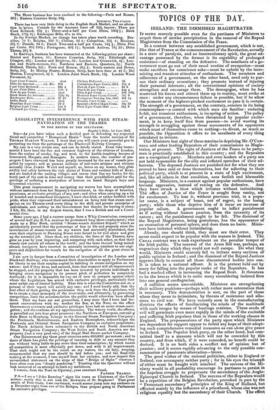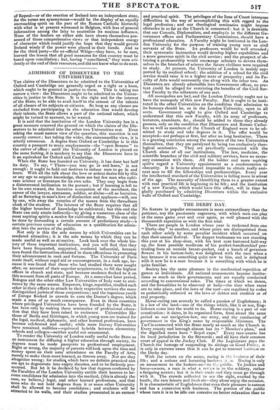TOPICS OF THE DAY.
IRELAND: THE DISMISSED MAGISTRATES.
IT seems scarcely possible even for the partisans of Ministers to acquit them of unwise precipitation in the removal of the Repeal Magistrates from the Commission of the Peace.
In a contest between any established government, which is not, like that of France at the commencement of the Revolution, actually in a state of paralysis, and an insurrectionary spirit, the great ad- vantage possessed by the former is its capability of prolonged resistance—of standing on the defensive. The assailants of a go- vernment must go out of their usual routine of occupation—must make sacrifices for conscience sake—must be upheld by the inter- mitting and transient stimulus of enthusiasm. The members and adherents of a government, on the other hand, need only to pur- sue their ordinary avocations ; they promote instead of injuring their personal interests; all the conventional opinions of society strengthen and encourage them. The demagogue, when he has mustered his forces and stirred them up to mutiny, must strike at once : under any circumstances failure is possible, but if he allow the moment of the highest-pitched excitement to pass it is certain. The strength of a government, on the contrary, consists in its being commonplace—a control with which men are familiar : enduring habit, not transient enthusiasm, is its spring of action. The policy of a government, therefore, when threatened by popular excite- ment, is to keep itself free from passion—to avoid wasting its strength in struggling against those movements of its opponents which must of themselves come to nothing—to divest, as much as possible, the Opposition it offers to its assailants of every thing calculated to irritate.
Our Ministers lost sight of these maxims in depriving Mr. °TON.. HELL and other leading Repealers of their commissions as Magis- trates, at present. The right of Justices of the Peace to be party- men is practically established in this country ; and the Repealers are a recognized party. Members and even leaders of a party are not held responsible for the silly and inflated speeches of their ad- herents. The deposed Justices are punished not for what they are proved to have said or done themselves, but for adhering to their political party, which is at present in a state of high excitement, and, like all others in that condition, uses foolish and blameable language. Ministers, in a contest against popular enthusiasm, have become aggressive, instead of resting on the defensive. And they have struck a blow which irritates without intimidating. The office of Justice of the Peace is sought from vanity, not for emolument. To lose it, without previous trial, in a popu- lar cause, is a subject of boast, not of regret, to the losing party; while those who deprive him of it incur an increase of popular odium. A government ought to inflict punishment as if acting without human passion, from the necessity of its nature ; and the punishment ought to be felt. The dismissal of the Repeal Magistrates, being gratuitous, has the appearance of an emanation of personal spleen, and does them no harm. Minis- ters have irritated without intimidating. Already, one should think, they must see their error. They never could expect to be popular with the masses in Ireland. The CROAL contract was a rash experiment on the peculiar temper of the Irish public. The renewal of the Arms Bill was, perhaps, an ungracious duty which they could not well escape. Do what they would, Ministers could scarcely fail to irritate many sections of public opinion in Ireland ; and the dismissal of the Repeal Justices, appears likely to cement all those discontented bodies into one. It is taken as a national affront. It is the pretext held out by many for falling into the popular ranks of the Repealers. It has bad a marked effect in increasing the Repeal Rent. It threatens to be the breeze which is to unite many smouldering isolated fires into one general conflagration.
A collision seems unavoidable. Ministers are strengthening their military positions—perhaps with rather more ostentation than is necessary. This demonstration is met, on the part of those whom they mean to intimidate, by threats of resistance and allu- sions to civil war. We have recently seen in the manufacturing districts the effects of familiarizing the minds of the multitude with such images by means of hustings orations. These seeds of evil will germinate even more rapidly in the minds of the excitable and suffering Irish populace than in those of the working classes in England. The prepossessions of the party upon which Ministers are dependent for support appear to forbid any hope of their adopt- ing such comprehensive remedial measures as can alone give peace to Ireland. The Popular Irish party, on the other hand, had com- mitted itself to a measure which will not be conceded by this country, and from which, if' it were conceded, DO benefit could be derived. It is on both sides a conflict not of opinion but of passion ; and it seems rapidly advancing to the only possible con- summation of passionate altercation—blows. The good wishes of the rational politician, either in England or Ireland, can accompany neither party ; for in his eyes the triumph of either must be fraught with mischief. The success of the Mi- nistry would in all probability encourage its partisans to persist in the hopeless struggle to perpetuate the ascendancy of the Anglo- Episcopal Church in Ireland. The success of the Repealers would be a repetition of the Belgian Revolution, provoked in part by the " Protestant ascendancy" principles of the King of Holland, but effected mainly by the influence of a priesthood, whose aim was not religious equality but the ascendancy of their Church. The effect
of Repeal—or of the erection of Ireland into an independent state, for the terms are synonymous—would be the display of an equally encroaching spirit on the part of the Roman Catholic hierarchy with what is at present witnessed in Belgium, with less of general information among the laity to neutralize its noxious influence. None of the leaders on either side have shown themselves pos- sessed of those comprehensive views or that independent energy of character which could justify the hope that they would govern Ireland wisely if the power were placed in their hands. And as for the third party—the ex-official Whigs—they have, to be sure, learned the lesson that all good measures for that country must be based upon conciliation; but, having "conciliated," they were evi- dently at the end of their resources, and did not know what to do next.



























 Previous page
Previous page